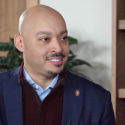Nine Faculty Honored for Mid-Career Promise
Nine University of Wisconsin–Madison professors have received a financial boost to their research at mid-career, a time when years of carefully cultivated scholarship can yield great returns.
The Wisconsin Alumni Research Foundation (WARF) and the Graduate School created the Mid-Career Awards in 1995 to provide financial support to faculty during what is often their most productive phase. The $60,000 awards are given to faculty who are between five and 20 years past tenure, and are nominated by their colleagues.
This year, 35 faculty in a variety of disciplines were nominated. The Graduate School research committee selected winners based not only on a strong record of research achievement, but on the quality of their teaching and service contributions. The 1997 winners are:
- Baha Balantekin, professor of physics. Balantekin works at the interface of nuclear physics, particle physics and astrophysics. His current research is focused on theoretical neutrino astrophysics. He studies, among other issues, the role of neutrinos in the dynamics of the early universe, and the development of new mathematical techniques to address the neutrino physics.
- Stephen Dembski, professor of music. A gifted composer of concert music, Dembski’s compositions have been praised for their “superb craftsmanship, intellectual depth and exquisite lyricism.” In 1996, his chamber concerto for violin, “Out of My System,” was performed by the Philadelphia Orchestra; and his setting of Donald Barthelme’s “The Show” was performed by the Hirshorn Museum and Sculpture Gallery of the Smithsonian Institution. In addition to CDs from 1989 and 1991, two more CDs devoted to his music will be released this year.
- Truman Lowe, professor of art. Lowe combines unusual gifts as an artist and a teacher committed to community service. His powerful adaptations of traditional Winnebago media to modern art, such as his work “Feather Canoe,” have received critical acclaim. His sculpture and water drawings link personal experience, observation of nature and appreciation of tradition. Lowe’s artwork has appeared in 29 solo exhibitions and more than 70 group exhibits.
- Terrie Moffitt, professor of psychology. Moffitt is widely acclaimed for her research on anti-social, criminal and violent behavior. She developed a theory that contends that anti-social behavior covers two developmental trajectories: “life-course persistent,” which is a form of psychopathology; and “adolescence-limited,” which is relatively benign.
- Ann Palmenberg, professor of animal health and biomedical sciences and the Institute for Molecular Virology. Palmenberg is recognized as a leader in molecular virology for her work on the genetic structure, function and evolution of cardioviruses. Her most significant achievement has been identifying proteins where viruses can be attacked with vaccines. She also uses the power of computers to visualize viruses and decode genetic information.
- Steve Stern, professor of history. Stern has achieved great stature in the field of Latin American history. His first major book is a landmark study of the indigenous Indian reaction to Spanish conquest and early colonial rule in Peru. His most recent book explores the complex facets of gender relationships in three separate Mexican regions.
- Michael R. Sussman, professor of horticulture. Sussman’s research focuses on the ways plants take up solutes and assess their environment, and the role plasma membrane proteins play in these vital processes. He initiated an ambitious program looking into the molecular genetics of the model plant Arabadopsis thaliana. He also led the establishment of the Arabadopsis training group at UW–Madison, which produced the first federally-funded training grant for plant molecular biology on this campus.
- Marvin Wickens, professor of biochemistry. Wickens directs a laboratory program ranked as one of the very best in the competitive field of RNA processing and function. In addition to many contributions in that field, his laboratory has made technical advances that have improved the work of other scientists. His teaching and training contributions are highly regarded, and he has served on national committees on research funding.
- John C. Wright, professor of chemistry. Wright is a pioneer in the field of laser spectroscopy – using laser light to examine the atomic structure of materials and improve understanding of solid state chemistry. He is currently using that technology to develop new materials based on the soccer ball-shaped Bucky-Ball molecules and new methods of vibrational spectroscopy based on non-linear effects. Wright is a gifted educator and received the Chancellor’s Excellence in Teaching Award in 1994.



